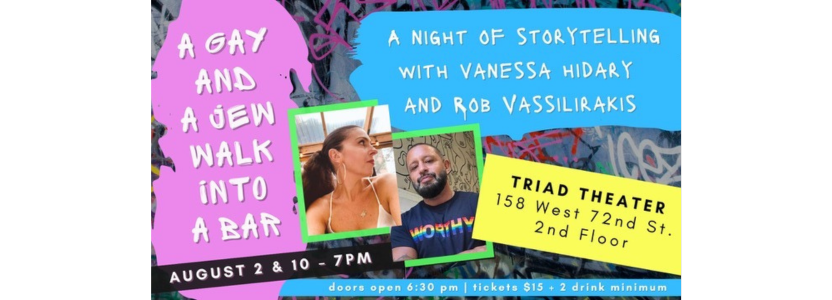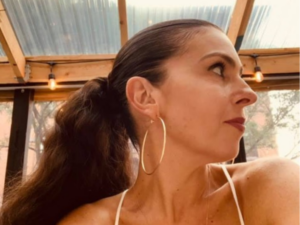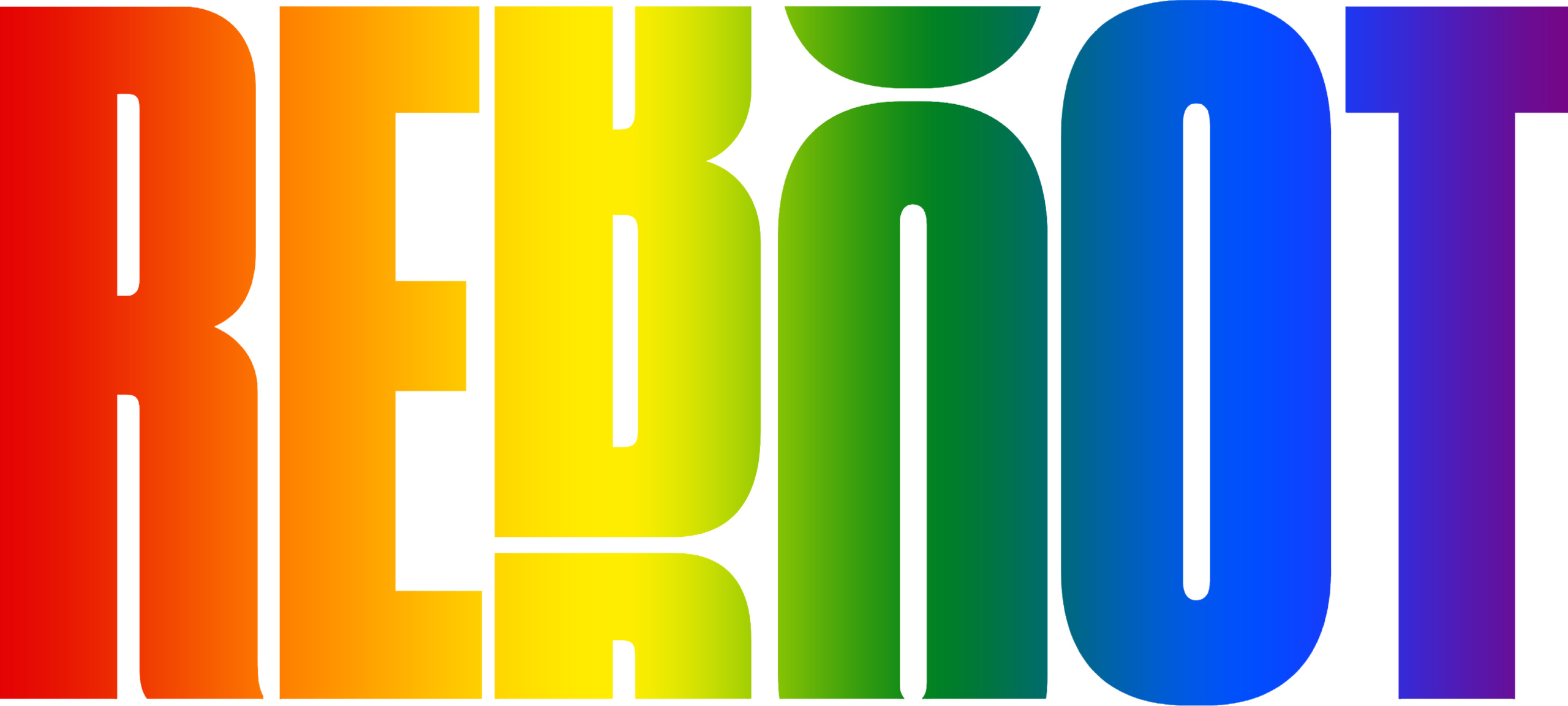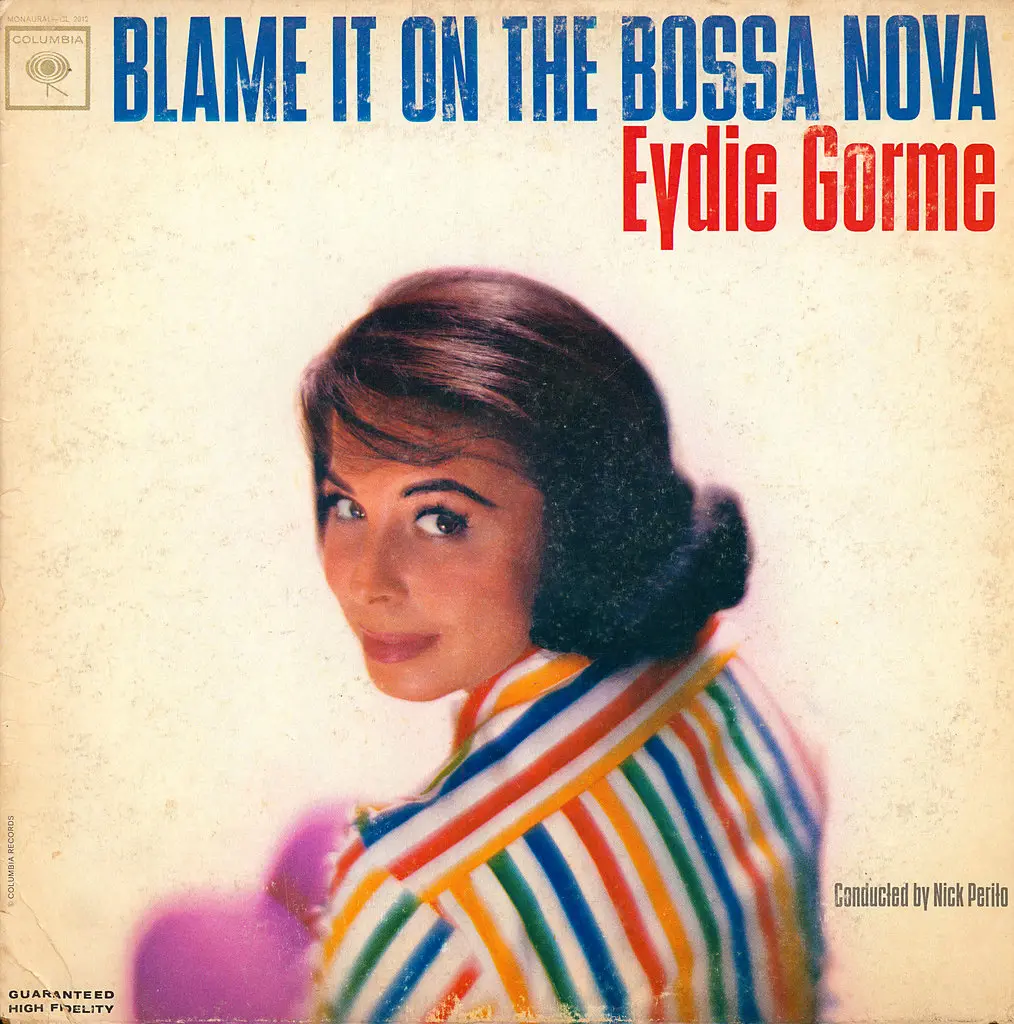A Gay And A Jew Walk Into A Bar…

We were intrigued when we saw the title of Reboot Network member Vanessa Hidary’s new story telling show – “A Gay And A Jew Walk Into A Bar.” We sat down with her to find out how it came about. The show digs further into the topic of identity that Hidary has long explored. Her poem, “The Hebrew Mamita,” went viral in 2003, garnering more than a half a million YouTube hits and igniting widespread discussion among Jews and non Jews alike on the subject of identity. Read more about the show below and get tickets here for the afternoon of storytelling at the Triad Theater with Vanessa Hidary & Rob Vassilarakis.
The concept of this show is interesting. What was the inspiration for the show? How did it evolve?
My good friend Rob Vassilarakis and I have been in the spoken word scene together for more than 15 years. We always dreamed of collaborating but could never find the right time or material.
When my daughter was 3-years-old I felt very disconnected from my career. I was swallowed by motherhood. It was an amazing time in my life, but I didn’t quite feel like myself. I had been performing consistently for more than 20 years and started having doubts that I could still do it! So in April 2019, I reached out to The Triad theater where I had done dozens of shows, and booked two dates in August. I had NO IDEA what I was going to perform but I knew if I booked the dates, I’d have to come up with something. I’m much more of a deadline kind of artist. Once I booked the dates, I instantly knew I didn’t want to do the show alone. I already felt isolated and I needed community. Immediately I called Rob and said “If I don’t do a show soon I am afraid my career is going to end. Are you in?”. Rob said yes, and we proceeded to get together and read each other our work. Rob shared some very personal writing about his experience growing up gay in the 1980’s, and his relationship with his mother. I went home and threw out all I had started writing. It did not feel authentic and Rob’s bravery pushed me to write about something I’d been avoiding, my journey to motherhood. I had endured four years of IVF fertility treatments, a miscarriage and finally a traumatic successful pregnancy. I was unable to write or even talk much about my journey while I was in it. People who knew what I was going through encouraged me to share my story, but I would get really defensive. I wasn’t ready. I stand firmly in the belief that as a writer/performer you need to know yourself well enough to know when you are ready to share personal stories with an audience. People think it’s easy for us to pour our hearts out, but it’s not. You have to be prepared for people’s reactions, questions and to relive the trauma. I was ready. I knew because I started it as a comedy. When I can find the comedy, I’m ready. The piece eventually morphed into a comedy/drama about my IVF journey. This is truly the best of me as a writer and performer.
At first Rob and I were thinking of a very traditional format of collaborating. One of us gets up and does a “set” and then the other follows. But as our pieces developed, we wondered what it might be like to intertwine our stories into one larger piece. Though our stories are very different, there is the common thread of vulnerability, comedy and a desperate wanting of something.
We received such a beautiful response from our audience that we added a few more to performances. Then the pandemic hit. Even after things calmed down, I found myself back in the same stuck, uncreative space so I reached out to Rob once again.
The Hebrew Mamita centered around the issue of identity. How did that experience impact you?
I wrote Hebrew Mamita and first performed it in 2003 at the legendary Nuyoricans Poets Cafe in the East Village. I wanted to write something from my own personal experiences as a Jew but have it be relatable to other cultures, races etc. I know so many people have experienced being told they “don’t look like or act like their people.” The audiences at Nuyo are very diverse, but there weren’t (at that time) many poets talking about being Jewish.The piece went over very well and it was exciting to me to have it be so relatable. It became my “signature” piece. It was much later on that I began to perform for Jewish communities and that added a whole other experience of relatability.
Sometimes I wish I had not named the piece, or dubbed myself “Hebrew Mamita” because it led some people to believe I am a Latina Jew, which I’m not. I just wanted to put together a name that represented and gave ode to how I grew up and what I was around. My intention was never to misrepresent myself or another’s culture. But I know the people who get it, get it and I’ve always been a lover of word combinations to invoke thought.
How have you continued to delve into the issues of identity? How does this new piece address identity?
This is the first show I have done that just slightly begins to tackle the subject of my daughter’s mixed identity. Her father is a non practicing Catholic from The Upper West Side whose parents are from the Dominican Republic and I’m a Reform Ashkenazi/Sephardic Jew also from the Upper West Side. We are raising our Jewminicana daughter as a Jew that celebrates Christmas. Basically my dream job.
How does your Jewish identity influence your work?
It’s in everything I write. I don’t think I have one piece that doesn’t mention something “Jewy.” And my humor is a Larry David, Jon Stewart kind of Jewish humor blended with some tears and sass.
What do you want audiences to take away from this show?
The stories in this show are extremely personal. We even understand that they could be triggering to people with a history of trauma, abuse and loss. But when I go out, I want to see and hear fleshy, funny stories and I think we have achieved that. Also it is also exciting to hear people’s feedback about how they feel our two stories parallel each other. SO different yet it works!
We have to ask, WHAT does a Sugar-Hill-Gang-era of hip-hop loving Jewish girl, new first time Mom from the old Upper West Side have in common with a gluttonous, Pit Bull adoring, gay, Greek/ El Salvadoran (that everyone thinks is Puerto Rican) puto from Great Neck? You don’t have to reveal the whole show to us, but we’d love a teaser.
Oh yeah, that. LOL. Honestly this was a botched attempt at writing a “blurb for our show.” We have struggled to write one and this interview might be the closest I’ve been to trying to explain the show. I will say Rob and I have always bonded over our upbringings.
Rob is a Latino who grew up around a lot of Jews, and I’m a Jew from the OLD Upper West Side who grew up around a lot of Latinos.
Rob is the only non Jewish friend I’d take to see the show “Just For Us.” Which is exactly what I did, and he got all of it.
If someone who comes to the show can write us a blurb, I’ll buy you dinner!!!
What kind of stories are important to you? Why do you find it particularly important to tell [your own] Jewish stories?
Underrepresented voices. A few years ago I created a monologue show for Jews of color and of Sephardic/Mizrahi descent. It was such an amazing experience to be on the other side of the table as director/producer helping people write their stories. I strongly believe these are the stories that many Jews and non Jews alike need to hear in order for us to grow as a people, and as a community.
![]()
 Vanessa Hidary is an internationally acclaimed Spoken Word Artist/Solo Performer/Author/ Actress/Writer/Director, who grew up on Manhattan’s culturally diverse Upper West Side. Her experiences as a Sephardic Jew with close friends from different ethnic and religious backgrounds inspired her to write “Culture Bandit” the nationally toured solo show that chronicles Vanessa‘s coming of age during the golden age of Hip-Hop. She has aired three times on “Russell Simmons Presents ‘Def Poetry Jam’ on HBO, and is featured in the award winning film “The Tribe” which was selected for the Sundance Film Festival, The Tribeca Film Festival, and The Jewish Motifs International Film Festival in Warsaw, Poland. Her popular poem, “The Hebrew Mamita,” went viral garnering over half a million YouTube hits, igniting widespread discussion among Jews and non Jews alike regarding the subject of identity.
Vanessa Hidary is an internationally acclaimed Spoken Word Artist/Solo Performer/Author/ Actress/Writer/Director, who grew up on Manhattan’s culturally diverse Upper West Side. Her experiences as a Sephardic Jew with close friends from different ethnic and religious backgrounds inspired her to write “Culture Bandit” the nationally toured solo show that chronicles Vanessa‘s coming of age during the golden age of Hip-Hop. She has aired three times on “Russell Simmons Presents ‘Def Poetry Jam’ on HBO, and is featured in the award winning film “The Tribe” which was selected for the Sundance Film Festival, The Tribeca Film Festival, and The Jewish Motifs International Film Festival in Warsaw, Poland. Her popular poem, “The Hebrew Mamita,” went viral garnering over half a million YouTube hits, igniting widespread discussion among Jews and non Jews alike regarding the subject of identity.




